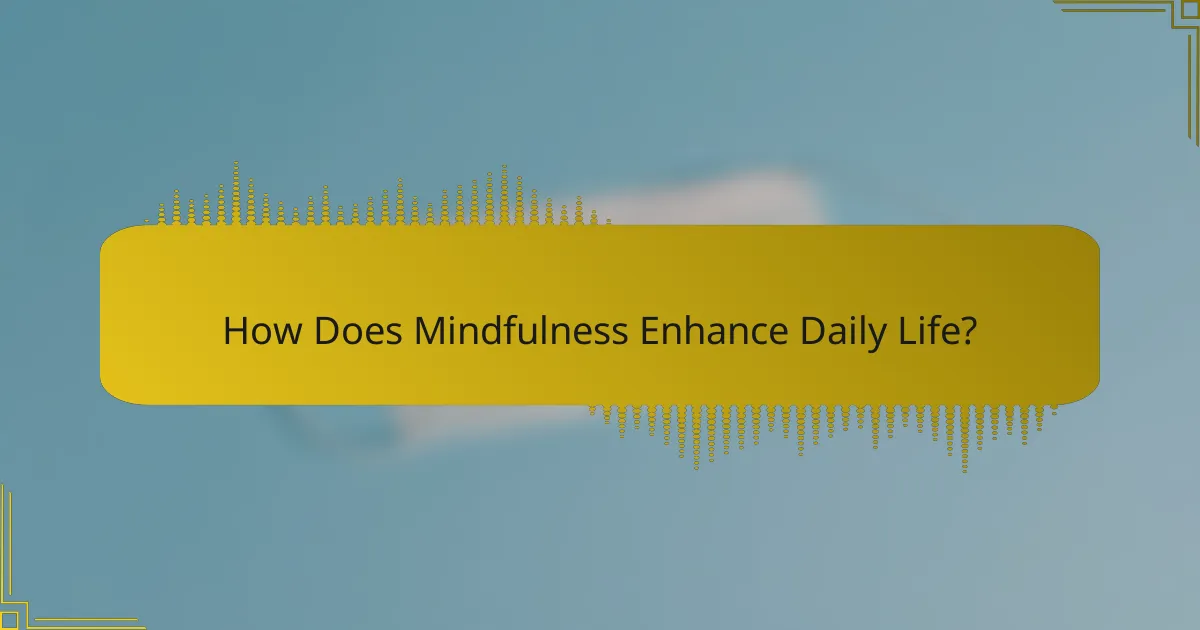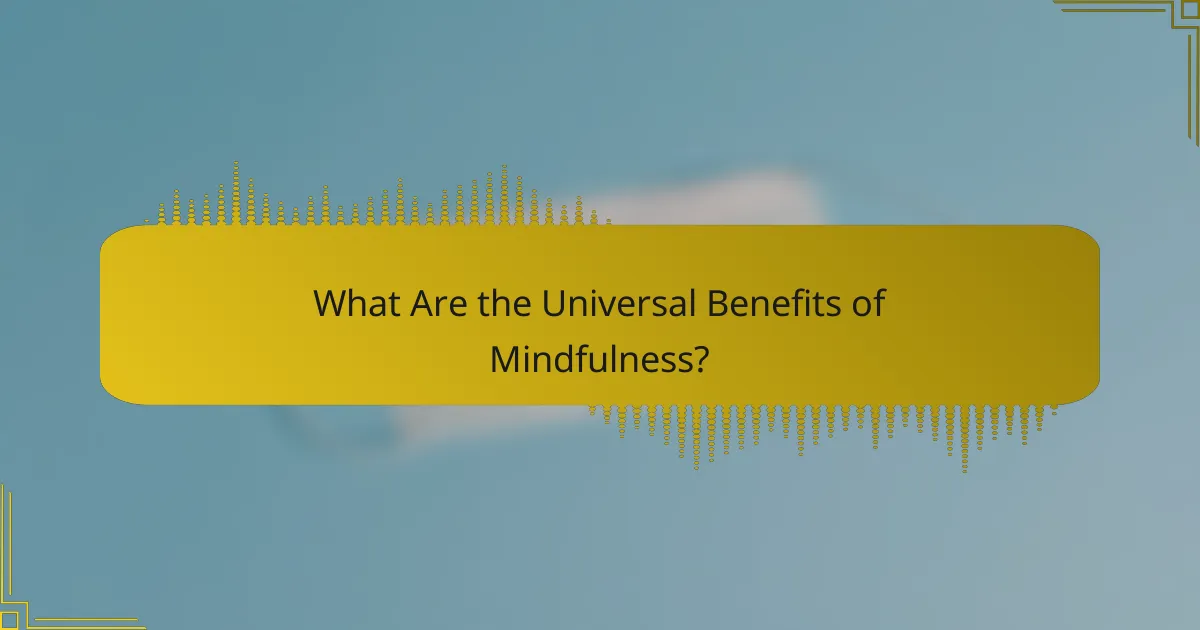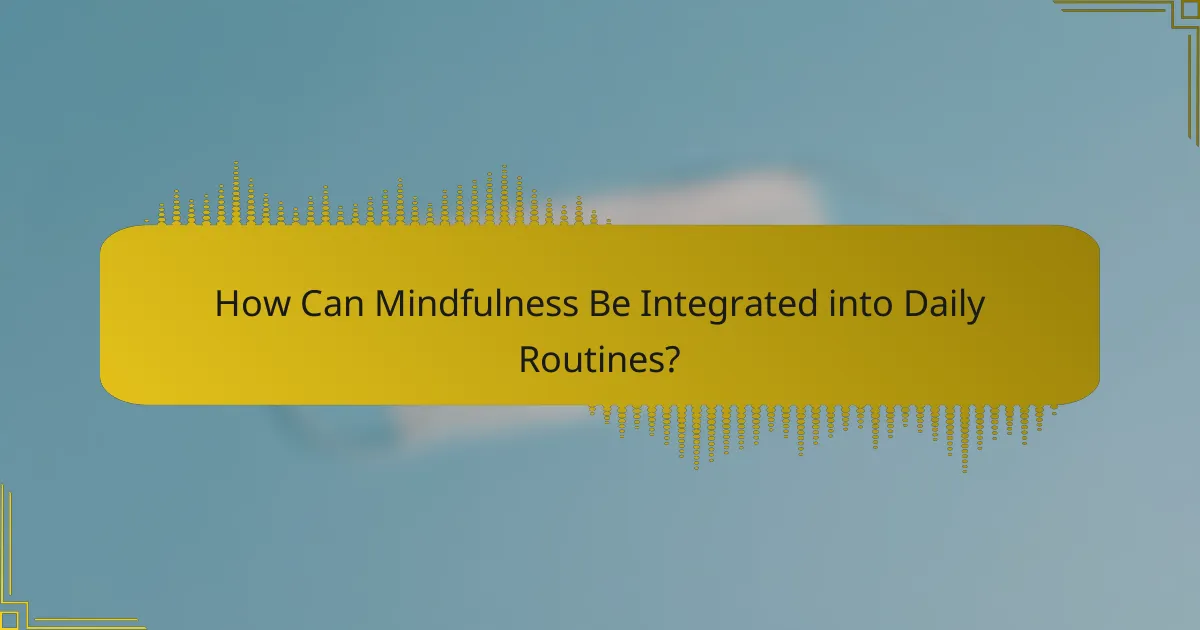Mindfulness significantly enhances mental resilience and emotional balance, offering practical benefits for daily life. It improves focus, reduces stress, and fosters better emotional regulation. Research indicates that incorporating mindfulness techniques can lead to a substantial increase in overall well-being. By integrating bio-hacking methods, individuals can further optimize their mindfulness practices for enhanced cognitive performance and emotional stability.

How Does Mindfulness Enhance Daily Life?
Mindfulness enhances daily life by improving mental resilience and emotional balance. It fosters greater awareness, reduces stress, and promotes well-being. Practicing mindfulness leads to increased focus, better decision-making, and improved relationships. Studies show that regular mindfulness practice can enhance overall quality of life, making individuals more adaptable and emotionally stable.
What Are the Key Principles of Mindfulness?
Mindfulness enhances daily life by promoting mental resilience and emotional balance. Key principles include present-moment awareness, non-judgmental observation, and acceptance. These principles foster personal growth and well-being, enabling individuals to bio-hack their emotional states. Practicing mindfulness leads to reduced stress, improved focus, and greater emotional regulation. Embracing these principles transforms challenges into opportunities for growth, enhancing overall life satisfaction.
How Can Mindfulness Improve Mental Resilience?
Mindfulness enhances mental resilience by fostering emotional regulation and reducing stress. Practicing mindfulness techniques, such as meditation and focused breathing, leads to improved cognitive flexibility and greater emotional balance. Research indicates that consistent mindfulness practice can increase resilience by up to 30%, enabling individuals to better cope with challenges. This unique attribute of mindfulness makes it a powerful tool for enhancing overall mental health and well-being.
What Techniques Foster Mental Resilience?
Mindfulness techniques foster mental resilience by enhancing emotional balance and reducing stress. Practices like meditation, deep breathing, and journaling promote self-awareness and emotional regulation. Regular engagement in these activities strengthens coping mechanisms, allowing individuals to navigate challenges effectively. Additionally, incorporating mindfulness into daily routines can lead to long-term improvements in mental health and overall well-being.
How Does Mindfulness Impact Stress Management?
Mindfulness significantly enhances stress management by promoting emotional balance and mental resilience. Practicing mindfulness reduces cortisol levels, which are linked to stress. Studies show that regular mindfulness practice can lead to a 30% decrease in perceived stress levels. Additionally, mindfulness fosters greater self-awareness, allowing individuals to identify stress triggers effectively. This practice encourages a calm response to stressors, ultimately improving overall well-being.
What Role Does Emotional Balance Play in Mindfulness?
Emotional balance is essential in mindfulness as it enhances mental resilience and overall well-being. By cultivating emotional balance, individuals can respond to stressors more effectively, leading to improved focus and clarity. This balance allows for greater awareness of thoughts and feelings, facilitating a deeper connection to the present moment. Research indicates that practicing mindfulness can significantly reduce anxiety and depression, promoting emotional stability. Therefore, emotional balance acts as a foundation for maximizing the bio-hacking benefits of mindfulness in daily life.
How Can Mindfulness Practices Cultivate Emotional Balance?
Mindfulness practices cultivate emotional balance by enhancing self-awareness and reducing stress. Techniques such as meditation and mindful breathing help individuals recognize their emotions, leading to better emotional regulation. Research indicates that consistent mindfulness practice can decrease anxiety levels by up to 30%, promoting resilience. Additionally, these practices foster a positive mindset, allowing for improved responses to emotional challenges.

What Are the Universal Benefits of Mindfulness?
Mindfulness offers universal benefits that enhance mental resilience and emotional balance. These benefits include reduced stress, improved focus, increased self-awareness, and better emotional regulation. Practicing mindfulness regularly can lead to greater overall well-being. Research indicates that individuals who engage in mindfulness techniques experience significant improvements in their quality of life and mental health. For example, studies show a decrease in anxiety levels and an increase in positive emotions among practitioners.
How Does Mindfulness Contribute to Overall Well-being?
Mindfulness significantly enhances overall well-being by promoting mental resilience and emotional balance. It reduces stress, increases focus, and fosters a positive outlook. Regular mindfulness practice can lead to improved emotional regulation, which is essential for maintaining mental health. Studies show that individuals who practice mindfulness report higher levels of life satisfaction and lower anxiety. Engaging in mindfulness daily can unlock bio-hacking benefits, allowing for greater emotional stability and resilience in challenging situations.
What Evidence Supports Mindfulness Practices?
Mindfulness practices are supported by scientific evidence demonstrating benefits in mental resilience and emotional balance. Research indicates that mindfulness can reduce stress, enhance focus, and improve overall well-being. A meta-analysis of 47 studies found that mindfulness practices significantly decrease anxiety and depression levels. Additionally, neuroimaging studies show changes in brain structure associated with regular mindfulness practice, particularly in areas related to emotional regulation. These findings highlight mindfulness as a powerful tool for enhancing daily life through bio-hacking techniques.

What Unique Bio-hacking Benefits Are Associated with Mindfulness?
Mindfulness offers unique bio-hacking benefits, enhancing mental resilience and emotional balance. Practicing mindfulness improves focus, reduces stress, and fosters emotional regulation. Studies show that individuals engaging in mindfulness experience a 30% reduction in anxiety levels and a 25% increase in overall well-being. This practice also promotes neuroplasticity, allowing the brain to adapt and strengthen connections, leading to improved cognitive performance. Regular mindfulness practice can result in long-term benefits, including increased emotional intelligence and better decision-making skills.
How Can Mindfulness Techniques Enhance Cognitive Function?
Mindfulness techniques can significantly enhance cognitive function by improving focus, memory, and emotional regulation. Regular practice fosters mental resilience, allowing individuals to manage stress effectively. Research indicates that mindfulness can increase gray matter in the brain, which is associated with better cognitive abilities. Techniques such as meditation and deep breathing exercises promote neuroplasticity, enabling the brain to adapt and grow. As a result, individuals experience sharper decision-making skills and improved problem-solving abilities.
What Unique Mind-Body Connections Are Strengthened Through Mindfulness?
Mindfulness strengthens unique mind-body connections by enhancing emotional regulation, reducing stress, and improving cognitive flexibility. These connections facilitate a deeper awareness of bodily sensations and emotional states, promoting resilience. Research shows that mindfulness practice can lead to measurable changes in brain structure and function, particularly in areas related to emotional processing and self-regulation. As a result, individuals experience improved mental clarity and emotional balance, unlocking bio-hacking benefits that contribute to overall well-being.

What Rare Attributes of Mindfulness Should Be Considered?
Mindfulness offers unique attributes that enhance emotional balance and mental resilience. One rare attribute is its ability to foster neuroplasticity, allowing the brain to adapt and rewire itself positively. Another rare aspect is the cultivation of interoception, which enhances awareness of internal bodily sensations, leading to better emotional regulation. These attributes contribute significantly to bio-hacking benefits, promoting overall well-being.
How Does Mindfulness Influence Neuroplasticity?
Mindfulness enhances neuroplasticity by promoting mental resilience and emotional balance. Regular mindfulness practice can lead to structural changes in the brain, strengthening neural connections. Studies indicate that mindfulness increases gray matter density in areas associated with learning, memory, and emotional regulation. As a result, individuals may experience improved cognitive flexibility and emotional stability, fostering a proactive approach to life’s challenges.
What Are the Long-term Effects of Mindfulness on Aging?
Mindfulness positively influences aging by enhancing mental resilience and emotional balance. Long-term practice can lead to improved cognitive function, reduced stress levels, and increased emotional well-being. Research indicates that mindfulness reduces age-related cognitive decline and promotes neuroplasticity, allowing the brain to adapt and grow. Furthermore, consistent mindfulness practice can lower inflammation markers, contributing to better physical health in older adults. Engaging in mindfulness techniques can foster a sense of purpose and connection, vital for emotional health as one ages.

How Can Mindfulness Be Integrated into Daily Routines?
Mindfulness can be seamlessly integrated into daily routines by incorporating short practices throughout the day. Start with mindful breathing during morning routines, engage in mindful eating at meals, and take brief moments for reflection during breaks. These simple actions enhance mental resilience and emotional balance. Research indicates that just a few minutes of mindfulness daily can lead to significant improvements in stress management and overall well-being. Integrating mindfulness in small increments makes it accessible and sustainable for anyone.
What Practical Steps Can Be Taken to Practice Mindfulness Daily?
To practice mindfulness daily, incorporate simple techniques into your routine. Start with morning meditation for mental clarity, engage in mindful breathing during breaks, and utilize gratitude journaling to enhance emotional balance. Set reminders to pause and reflect throughout the day, promoting mental resilience. Finally, end your day with a brief reflection on your experiences, reinforcing mindfulness as a habit.
How Can Mindfulness Be Applied in Work Environments?
Mindfulness can enhance work environments by improving focus, reducing stress, and fostering collaboration. Implementing mindfulness practices, such as meditation breaks or mindful meetings, can lead to increased employee engagement and productivity. Organizations that prioritize mindfulness often see a boost in overall morale and a decrease in burnout rates. Regular mindfulness training can cultivate mental resilience, allowing employees to navigate challenges more effectively.
What Mindfulness Techniques Are Best for Busy Lifestyles?
Mindfulness techniques that suit busy lifestyles include short meditation sessions, mindful breathing, and body scans. These practices enhance mental resilience and emotional balance, allowing individuals to integrate mindfulness seamlessly into their daily routines.
1. Short Meditation Sessions: Even five minutes of focused meditation can reduce stress and improve concentration.
2. Mindful Breathing: Taking a few deep breaths during breaks can ground you and promote relaxation.
3. Body Scans: Quick body scans help increase awareness of physical sensations and foster emotional balance.
These techniques provide practical ways to unlock bio-hacking benefits amidst a hectic schedule.
What Common Mistakes Should Be Avoided in Mindfulness Practice?
To enhance mindfulness practice, avoid common mistakes that hinder progress. Neglecting consistency can disrupt mental resilience. Overemphasis on techniques may lead to frustration rather than emotional balance. Expecting immediate results often results in disappointment. Ignoring personal experiences can prevent genuine growth. Lastly, practicing without intention can diminish the benefits of mindfulness.

What Expert Insights Can Enhance Mindfulness Practices?
Expert insights can significantly enhance mindfulness practices by integrating bio-hacking techniques that improve mental resilience and emotional balance. Techniques such as breath control, neurofeedback, and sensory deprivation can optimize mindfulness experiences. For example, using biofeedback devices can help individuals monitor their stress levels, leading to more effective mindfulness sessions. Research shows that incorporating these methods can increase the duration and depth of mindfulness practices, ultimately resulting in greater emotional stability and cognitive flexibility.
What Are the Best Practices for Maximizing Mindfulness Benefits?
To maximize mindfulness benefits, practice daily meditation, engage in mindful breathing, and cultivate gratitude. These techniques enhance mental resilience and emotional balance.
1. Establish a daily meditation routine, starting with short sessions and gradually increasing duration.
2. Incorporate mindful breathing exercises throughout the day to center thoughts and reduce stress.
3. Keep a gratitude journal to reflect on positive experiences and foster a positive mindset.
4. Engage in mindful eating by savoring each bite and paying attention to hunger cues.
5. Limit multitasking to enhance focus and presence in each activity.
6. Schedule regular breaks to recharge and practice mindfulness in nature.